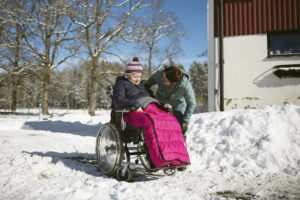Measles is a severe and very contagious disease that was once eradicated in the United States. However, it has recently been making a frightening comeback. For those who are immunocompromised, measles can lead to serious or fatal complications. Vaccination can prevent many of these complications and lower the risk of contracting the disease.
Before the measles vaccination became available in 1963:
- An estimated 3 to 4 million people got measles each year in the United States
- Approximately 500,000 cases each year were reported to the Centers for Disease Control (CDC)
- Among those reported cases, 400 – 500 patients died, 48,000 were hospitalized and 1,000 developed encephalitis (brain swelling) from measles
Since then, widespread use of the measles vaccine has led to a more than 99% reduction in measles cases compared with the pre-vaccine era. Measles is so contagious that if one person has it, up to 90% of the people close to them will also contract the disease. In addition, the measles virus can stay in the air for up to two hours after an infected person was there. Because of this, the virus can continue to spread even when you are not in direct proximity to someone infected with measles. Fortunately, two doses of the MMR vaccine (Measles, Mumps and Rubella) are about 97% effective at preventing measles, and one dose is about 93% effective.
Measles cases are currently on the rise
Despite an excellent history of containing measles, the virus has been gaining ground around the U.S. and the world. Health officials advise families to vaccinate their children against measles at six months old, especially if they plan to travel overseas.
In some states, five to seven percent of kindergartners have not been vaccinated against measles, putting those states below the herd immunity threshold (herd immunity is the portion of the population that must be immunized against infection to prevent its spread in that individual community).
Anti-vaccine movements and growing vaccine hesitancy have led to decreases in child immunization rates across the U.S. The rate of kindergarteners whose parents have opted them out of at least one state-required vaccination rose to a record high of 3% during the 2022-23 school year. According to the CDC, as of June 6, 2024, there have been 151 measles cases in the U.S., with 83% of cases being from unvaccinated individuals. Over 50% of the people who have contracted measles this year have required hospitalization.
Only an estimated 93.1% of kindergartners this past school year had received two doses of the MMR vaccine. This leaves nearly 250,000 children at risk for measles infection.
Who is most at risk?
Anyone who is not protected against measles is at risk; however, the disease is contracted most by children. Children younger than five years old, pregnant women and people who are immunocompromised are most likely to face severe complications with measles. For these fragile groups, measles can lead to high rates of hospitalization, severe or fatal pneumonia, encephalitis that can lead to deafness or intellectual disability, pregnancy complications or, unfortunately, death.
Health experts consider measles to be a “stealth virus,” meaning that all it takes is for one infected person to start an outbreak. Measles is more contagious than COVID-19 or the flu. Contracting the virus can also lead to getting subacute sclerosing panencephalitis (SSPE), a fatal disease of the nervous system that develops seven to ten years after the person was affected by measles. SSPE can cause memory loss, irritability, disturbances in movement, seizures and blindness.
Look out for the signs of measles
In addition to the well-known red spots on the skin, measles usually causes white spots in the mouth, making it painful for children to eat or drink. Many of those infected become dehydrated and malnourished, and about 20% become hospitalized because they need IV fluids.
In the days before children develop a red measles rash, symptoms may include:
- Cough
- Lethargy
- Runny nose
- Pink eye
- Fever
- Sensitivity to light
It is extremely important to stay up-to-date with all necessary vaccines to keep you, your children, and the people around you safe. The Centers for Disease Control and Prevention is a valuable resource for vaccine education and information. You can find information about vaccine schedules, travel advisories, signs and symptoms and more in English and Spanish.
Maxim Healthcare Services provides compassionate care to children across the country. If you have a child with compromised health who needs extra support, we can help. Contact your local Maxim office to learn about services that are available near you.



